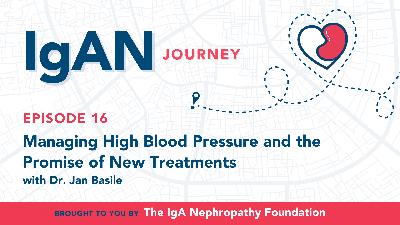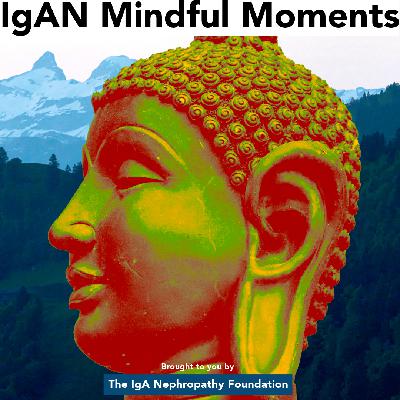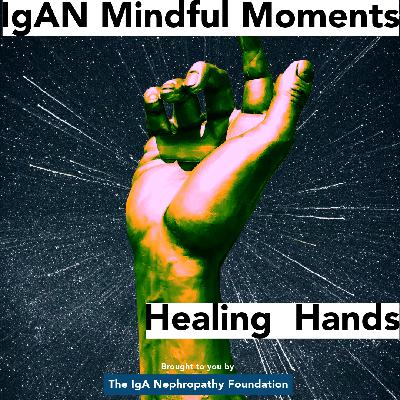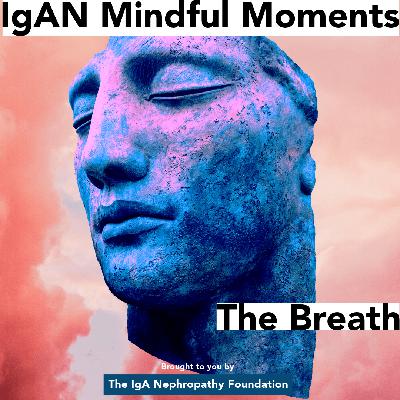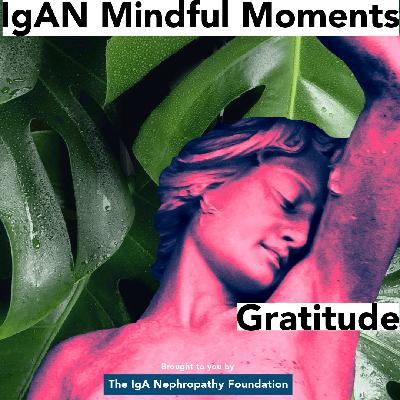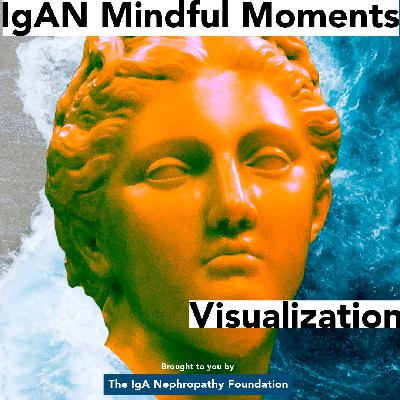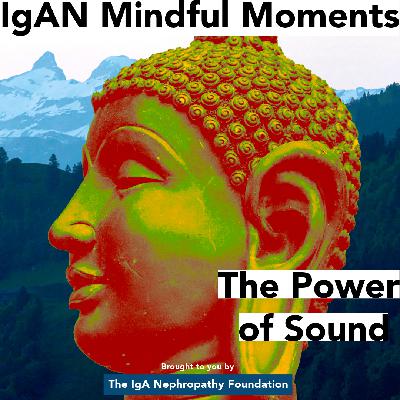Discover IgAN Journey
IgAN Journey

IgAN Journey
Author: igan.org
Subscribed: 1Played: 3Subscribe
Share
© 2023
Description
Whether you or someone you love has been diagnosed with the kidney disease IgA Nephropathy you are in the right place for information, support and encouragement. This podcast is brought to you by the IgA Nephropathy Foundation. It's mission: to be a patient-centric organization focused on finding a cure for IgA Nephropathy. Using the power of the patient community we are focused on funding research, using patient advocacy to empower our patients, and building a network of support.
You are not alone
https://igan.org/
You are not alone
https://igan.org/
22 Episodes
Reverse
In this special episode, Bonnie Schneider, co-founder of the IgA Nephropathy Foundation, shares her journey and reflects on 20 years of service to families affected by this rare disease. When her son Eddie was diagnosed with IgA Nephropathy (IgAN) at age 13, Bonnie and her husband felt lost and isolated. This profound experience motivated them to create a foundation that would ensure no family felt alone in their battle against IgAN. Today, the Foundation has become a beacon of support, advocacy, and hope for patients around the world. Bonnie speaks to the Foundation's mission to support and empower patients with information and to push for better and more targeted treatments and, ultimately, a cure. She highlights key milestones, including the launch of our annual SPARK meeting, reflecting on the emotional power of these gatherings: "Seeing the tears of joy, hugs, and the exchange of contact information… that's really, really powerful." Over the years and like any new endeavor, the Foundation has faced challenges, but perseverance and faith have been Bonnie's guiding principles. She recalls moments of doubt and credits her unwavering commitment to the cause and the support of her team for pushing through. "I made a deal… you just leave me the breadcrumbs and make sure I'm heading in the right direction." Her advice for anyone facing obstacles is simple: "Don't give up, just keep persevering." Bonnie's vision for the future is global, as the foundation is working to expand its reach and make sure no patient, regardless of location, feels alone. As she proudly states, "We want to be that life-saving community." Through new therapies, clinical trials, and a growing IgAN community, the Foundation continues to push for progress, always keeping the patient voice at the heart of their efforts. Support and Info Available Here
November is Caregiver Awareness Month and, in this episode, Yulanda Brown and Steve Mayo talk candidly about their IgAN journey and how staying centered on what brought them together has helped them grow closer despite their struggles. Yulanda's diagnosis came as a shock for both. The uncertainty and lack of information about the disease left them grappling with fear and confusion. There is a very definite learning curve that comes with becoming a caregiver/care partner, Steve shares – it's about leaning in, learning about the disease, asking for and accepting help, and realizing it's OK not to have all the answers. Consistently showing up and being there through the ups and downs is what matters most. But to do so, you have to take care of yourself so you can be present for and stay in sync with your loved one. The two speak openly about the unexpected emotional and physical strain on both patient and care partner and how the dynamics of their relationship have shifted with the diagnosis. Steve emphasizes the importance of communication, patience, and understanding in his role as a care partner, while also acknowledging the personal struggle that often accompanies it. This episode is a must-listen for anyone affected by IgAN, especially caregivers and care partners. Yulanda and Steve offer wisdom to others facing IgAN, reinforcing the importance of staying connected, communicating openly and grounding themselves in love. Their story is a reminder that while the journey may be long and challenging, it is also filled with moments of deep connection, love and hope. Their commitment to each other and to the IgAN community offers inspiration and comfort to those facing similar struggles. Yulanda and Steve have been together for over 38 years and celebrated their 36th wedding anniversary on November 5, 2024. Together, they have four children and seven grandchildren. Both are retired, Yulanda from Civil Service and Steve from Law Enforcement. They enjoy spending quality time with family and friends capturing moments that last a lifetime. Both Yulanda and Steve talk about how the IgA Nephropathy Foundation has supported them in their journey, helping them connect with others going through similar experiences – offering empathy, understanding and a sense of belonging. IgAN Support and Information
Living with IgA Nephropathy (IgAN) means not only managing the disease itself, as well as the related fatigue and other related health concerns, but also coping with the mental and emotional challenges come with having a chronic health concern. Patients may experience feelings of loss, depression, fear, denial, anger, or frustration over changes to their health and uncertainly of what the road ahead might look like. Loved ones often feel overwhelmed too faced with new responsibilities and concern. In this episode, we speak with David Walter, D.O, psychiatrist and ambassador for the IgAN Foundation. Dr. Walter specializes in helping patients manage chronic illnesses like Crohn's, colitis, and more. He also plays an active role in raising awareness for IgAN to help advance the Foundation's mission and reach patients earlier in their journey. David delves into the essential connection between mental and physical health for individuals with chronic illnesses. As someone who lives with chronic conditions himself, he provides a relatable and practical perspective on mindfulness, emotional awareness, and the importance of prioritizing mental well-being amidst daily challenges. He explains the concept of medical PTSD and how past medical experiences can continue to impact mental health. Through this lens, David shares practical tips for positive coping and incorporating mindfulness into daily life, emphasizing the importance of starting small and building consistency. Drawing from his personal journey, he also offers advice on managing stress, setting boundaries, and avoiding comparison—especially in today's social media-driven world. His insights are equally valuable for patients and their families, underscoring the importance of open communication, self-compassion and seeking support. Key Takeaways from the Episode: ● Mindfulness: Simple practices like deep breathing and mindful walking can help ease anxiety and improve emotional regulation by keeping individuals grounded in the present moment. ● Acceptance: Embracing one's emotions and circumstances without judgment is crucial for maintaining mental well-being, particularly for those with chronic illness. ● Communication and support: Open communication with loved ones and seeking professional help can strengthen relationships and provide emotional relief for both patients and caregivers. David's experience serves as an important reminder that mental health is just as vital as physical health. IgAN Support
Compared with other kidney diseases, IgA Nephropathy tends to strike at younger ages, often coinciding with starting a career and/or having a family. While pregnancy is possible for women with IgAN, it's not without its challenges. Planning for a family with IgAN requires early planning and close monitoring to achieve the best possible outcome for both mom and baby and to determine if the risks of carrying a baby might be too high. In this episode, Whitney Simmons, who lives with IgAN, is a nurse practitioner, and serves on IgA Nephropathy Foundation's Medical and Scientific Advisory Board, talks with us about family planning with IgAN. A dedicated advocate for people with IgAN and mother of two, she has personally navigated the many questions and decisions that come with pregnancy with IgAN. Whitney shares her journey – from the early days of pregnancy planning and pulling together a high-risk pregnancy team to post-pregnancy recovery. She offers invaluable advice for women with IgAN who are thinking about starting a family and reminds us that every woman -- and every pregnancy -- is different and that there are other ways to build a family too. She speaks to the importance of: Sharing your goals and wishes for a future family with your nephrologist as part of your overall care. Early planning and specialized medical care. This includes reviewing and adjusting medications before pregnancy to protect the baby, as well as managing risks around giving birth. A high-risk pregnancy OB/GYN should be part of your team. Recognizing the mental and emotional challenges of pregnancy and family planning and embracing the critical role of building a support system you can rely on. If you are worried about how IgAN might affect planning for a family of your own, you are not alone. Our community and resources are here to support you every step of the way. Stay connected with us and reach out for help or to share your own story. Together, we can make living with IgA Nephropathy and achieving big dreams a little bit easier. Resources: IgA Nephropathy Foundation
For many people, uncontrolled or unexplained high blood pressure may be the first sign of IgA Nephropathy (IgAN). That's because when the filtering capabilities of the kidneys are damaged, as is the case with IgAN, blood pressure can rise. In turn, elevated blood pressure can further damage the kidneys. The two are interconected. In fact, about 9 out of 10 people with chronic kidney disease have high blood pressure. In this episode, we are joined by expert, Dr. Jan Basile, to discuss how blood pressure management is a necessary and important part of treating IgAN. Dr. Basile explains the kidneys' pivotal role in regulating blood pressure and electrolyte balance, best strategies for measuring and lowering blood pressure, as well as the promise of newer therapies to help manage IgAN. Key topics discussed: ● The connection between blood pressure and the kidneys Kidney function influences blood pressure regulation and vice versa. Chronic kidney disease can lead to hypertension, while high blood pressure can accelerate kidney damage. ● Importance of taking blood pressure at home New evidence suggests that outcomes are better for patients who routinely take their blood pressure at home, rather than just at the clinic. Dr. Basile gives tips for how to get an accurate measure. ● Lifestyle modifications to lower blood pressure and also mitigate kidney damage For example, getting to and staying at a healthy weight, dietary changes, limiting sodium, increasing potassium intake, regular exercise, limiting alcohol, and quitting smoking. ● Effectively managing IgAN takes a village Patients must insist on coordinated care that involves nephrologists, primary care clinicians, and other specialists working together and being responsive to individual patient needs. By paying attention to and recording blood pressure numbers overtime, taking blood pressure-lowering medications as prescribed, and making healthy lifestyle changes, patients can feel more in control of their blood pressure, which can help the kidneys too. Important Links: Target: BP™ IgAN Website
IgAN Journey is dedicated to those affected by IgA Nephropathy (IgAN) and, in this episode, we have the pleasure of hearing from Texas Senator Kelly Hancock whose positive outlook has helped him live his best life despite his diagnosis with IgAN over 30 years ago. His diagnosis came at a time when much less was known about the disease, and there was so much uncertainty. Senator Hancock and his family kept his diagnosis private for many years, but after publicly sharing his story and talking about the importance of having access to resources and support early on, he found the IgA Nephropathy Foundation. Senator Hancock talks about his IgAN journey and recent transplant and shares his advice for others affected by the disease: staying positive, learning from it, and keeping up with the things that bring you joy. He also talks about his efforts to educate others about organ donation and support legislation to protect living donors. About 1 in 3 people with IgAN will eventually need dialysis or a kidney transplant at some point – organ donation can be lifesaving The Senator also shares what it was like to: Receive a live-saving kidney transplant from his son-in-law Changes since his transplant Healthy habits he's maintained throughout his life "Do what you can do for as long as you can do it." – Senator Kelly Hancock Senator Hancock is proof that people with IgAN can live a full life. Yes, it's uncertain, unpredictable, and difficult, but with the support of family and the right approach to life, it's possible. The IgA Nephropathy Foundation Connect with Senator Kelly Hancock: Website Facebook Twitter Relevant Links: Article: TX Sen. Kelly Hancock Recovers After Receiving a Kidney from His Son-in-Law by NBCDFW Article: My son-in-law's gift may have saved my life by Dallas News
In this episode, and in honor of Caregiver Awareness Month, Bonnie Schneider, co-founder of the IgA Nephropathy Foundation talks openly about her journey as a caregiver to her son, Eddie, and growing the Foundation. She offers practical advice and tips for how to navigate this journey as a caregiver or care partner to someone with IgAN, including letting go of guild and taking time to recharge, reflect and for self-care. One out of 5 American adults is a caregiver to someone with a chronic illness. It can take a major toll if you don't pay attention, which is why it's so important to connect with others and know that you are not alone. Remember, you need to take care of yourself to be able to take care of others, and it's not selfish to do so. Take a listen to our conversation. Connect with Bonnie Schneider: Website LinkedIn
Are you ready to embark on a journey of healing and self-discovery? Welcome to "IgAN Mindful Moments," the podcast that explores the transformative power of mindfulness for individuals living with IgA Nephropathy. One big misconception many people have is that meditation is about clearing or emptying your mind. Thats not possible. Nor it is our goal. Howver, there is a big difference between "thinking" and 'stressing". Stressing is when you let the mind run amok, where it stops being productive. Its more often than not.... drama. That worrying aspect of the brain comes from problem solving, but at some point it stops being productive. And so meditation is giving yourself a break. Its self care. Its you making space for yourself in your day. And we are going to give you some tools that have been shown through many traditions and cultures, to be helpful. Generally speaking, while the art of meditation may not be easy, it is simple. The practice will vary day to day, moment by moment, and your job is to simply allow whatever it is that comes up in your mind to come up, without having to control it or change it or make it different somehow. . Allow yourself to simply observe, just watch, without judgement. Theres no good no bad, no right no wrong. For once, you can just breath.
Are you ready to embark on a journey of healing and self-discovery? Our "IgAN Mindful Moments" series explores the transformative power of mindfulness for individuals living with IgA Nephropathy. In this episode, we explore the concept of healing hands and their ability to transmit positive energy and healing vibrations. Join us as we guide you through a meditation designed to channel this energy towards your well-being while living with IgA Nephropathy. Experience the soothing power of healing hands on your healing journey.
Are you ready to embark on a journey of healing and self-discovery? Our "IgAN Mindful Moments" series explores the transformative power of mindfulness for individuals living with IgA Nephropathy. In this episode, we explore the power of deep belly breaths as a way to manage stress and promote overall well-being for individuals with IgA Nephropathy. Join us on a journey of self-discovery, as we guide you through deep breathing techniques to foster inner peace and improve your resilience on the path to healing.
Are you ready to embark on a journey of healing and self-discovery? Our "IgAN Mindful Moments" series explores the transformative power of mindfulness for individuals living with IgA Nephropathy. Dive into a transformative experience with our body scan meditation. We'll take you on a journey through your own body, helping you connect with your physical sensations and gain insight into managing symptoms related to IgA Nephropathy. Discover the power of mindfulness and the profound connection between your mind and body.
Are you ready to embark on a journey of healing and self-discovery? Our "IgAN Mindful Moments" series explores the transformative power of mindfulness for individuals living with IgA Nephropathy. Cultivate a sense of gratitude in your journey with IgA Nephropathy. In this episode, we'll explore the healing potential of gratitude through guided meditation. You'll learn how to harness the positive energy of thankfulness to boost your resilience and find hope in the face of challenges.
Are you ready to embark on a journey of healing and self-discovery? Our "IgAN Mindful Moments" series explores the transformative power of mindfulness for individuals living with IgA Nephropathy. Visualization is a powerful tool for achieving your health goals. In this episode, we invite you to imagine your body's innate ability to heal. Through a series of guided visualizations, you'll envision a path to recovery and tap into the mind-body connection that can positively impact your experience with IgA Nephropathy.
Using sound to meditate can help anchor your mind, allowing you to let go of distractions or thoughts that don't ultimately serve you. Most of the human body is water, so researchers believe sound vibrations work in the body to help produce a calming effect. Join Franck Raharinosy as he guides you through meditation by immersing yourself in sound, focusing on your breath and being in the present.
Meditation has been around for thousands of years, and it turns out it's pretty good medicine for many people. Not only can meditation help us reset and tune into oiursevles by being more mindful and present, research also shows it carries a host of health benefits. For exampe, helping to ease anxiety, depression and chronic pain; lower blood pressure; and improve memory, sleep and concentration, among other positivies. And for people living with IgA Nephropathy and other life-changing chronic conditions, meditation can help you feel calmer and more grouonded in managing your disease. In this epiosde, we are joined by Fraqnck Raharinosy, an expert in souind meditation who shares howo meditation techniques can help, and how to integrate them into your daily life. He has also worked with us to produce a guided sound meditation for our IgAN community to take advantaage of as part of our IgAN Mindful Moments with more tools to come. Franck has been providing guided sound meditations since 2016 and hihs compassionate and warm energy shine through. In this episode, we talk about: The benefits of meditating and various approaches, including how sound medittion works Actionable tips for incorporating meditation and promote mindfuness in your life, which can help boosst coping and self-awareness How to prepare for your practice so that you are able to reach a blissfu state and be fully present And remember, mediation doesn't take a lot of time. When you have a few minutes of alone time, you can sit down comfortably, take deep breaths in through your nose and out through your mouth focusing on your breathing and restoring energy. Meditation and activities that help center you can do wonders for your mental and emotional health. So try it out. Access our mental health resources Connect with Franck Raharinosy: Website Instagram LinkedIn Connect with Franck Raharinosy: Website Instagram LinkedIn IgA Nephropathy Foundation
The kidneys are responsible for excreting and getting rid of a lot of the waste products that come through the body, and a lot of these waste products come from the food we eat. So it's important that we consume foods that are friendly to our kidneys and easy for the body to digest and breakdown, especially for those with diseases like IgAN. To give us very practical tips to eating better for our kidneys. Schusterman joined us to talk about all things nutrition. Dr. Shusterman is a Nephrologist practicing in Greenville, SC at Carolina Nephrology. He is also known as "The Cooking Doc" from his YouTube show. Here, he helps his patients find creative ways to use new ingredients to cook dishes that taste amazing. He also wrote his own cookbook, The Cooking Doc's® Kidney-Healthy Cooking: A Modern 10-Step Guide To Preventing & Managing Kidney Disease. Dr. Schusterman shared several tips including: ● Limit sugary drinks ● Eat more plant-based foods ● Eat less fast food ● Have a low-sodium diet Links: The IgAN Cookbook Connect with Dr. Blake Shusterman: Website Facebook YouTube Instagram Twitter
When someone gets a life-altering diagnosis such as IgAN, it not only affects the person living with it, but also the people around them. For parents, it's a different and unique experience. They provide support as they watch their child learn to cope and live with the impact of this disease. It can be a lonely and worrying experience navigating what are often unchartered waters, but it doesn't have to be. Today, we have with us Julie and Jeanette, two amazing moms of children who are at different stages of their IgAN journey. Their budding friendship speaks to the little blessings that can come from life's challenges. Even though they live states away from one another, they met at an event to raise awareness about the impact of IgAN, with both of their now adult children sharing their experiences. That chance meeting led to the start of a life-long friendship rooted in shared experiences, love for their children, music, and a mutual love for Babyface. "I found that on this journey, it's so very important to say it out loud, say that you're scared, anxious, that you don't know the questions to ask, say that I'm shaking and I don't know where to go from here." -Jeanette Julie and Jeanette talk about how their friendship has helped one other. They share the importance of making connections, being vulnerable and creating bonds that can help you through these uncertain times. For example, the connections: ● Between parents who are going through the same struggles. They say you can feel what is in each other's hearts without necessarily having to say the actual words. ● Between people living with IgAN. Their kids are now close friends. They are both working as IgAN Ambassadors to support other patients, especially those who are newly diagnosed and are at a loss on what to do. They want to encourage others by sharing their experiences. ● Outside the disease. When there is a disease such as IgAN, it can be all-consuming. A big part of your life revolves around the disease, so it's even more important to bond outside of it. They recommend spending time as parent and child or as friends just having fun and doing other things you both enjoy. And when asked about their wish for Mother's Day, both Julie and Jeanette don't want anything special, and only expressed their gratitude for the little things, and for their kids. This Mother's Day is also special since it falls on the same day as the 2 nd Annual IgA Nephropathy Awareness Day. May 14 marks the date when Bonnie and Ed Schneider formally launched the IgA Nephropathy Foundation a journey that began after their son was diagnosed and there was nowhere to turn. It's not always an easy road for parents of children with a diagnosis, but it is amazing when they are able to find each other, support one another, and form a bond that would last a lifetime, like how Julie and Jeanette have.
https://igan.org/ Guest Dr. Jonathan Barratt talks with us about two new treatments for IgA Nephropathy (IgAN) –the first specifically designed and approved for the management of IgAN. TARPEYO® (budesonide, delayed release capsules) was approved by the U.S. Food and Drug Administration (FDA) in December 2021 and FILSPARI™ (sparsentan) gained approval earlier this year. Both are prescription medicines used to lower levels of protein in the urine (proteinuria) in adults with IgAN who are at risk of their disease progressing quickly. Dr. Barratt, who is a nephrologist at the University of Leicester in the UK, says their approvals mark a pivotal turning point for many people with IgAN and their caregivers. As principal investigator for many international randomized controlled clinical trials in IgAN, he has seen major advancements in treatments for IgAN, with many more clinical trials underway to study additional therapies and deepen our understanding of the root cause of the disease. He encourages patients to learn about their IgAN, and ask about new treatments, including the potential benefits and side effects, as well as available clinical trials. In this episode, you will learn the following: 1. How two new FDA approved therapies work. 2. What lifestyle changes can help protect kidney function. 3. How to access new therapies and treatment options to maintain kidney health over the long-term.
Learn more about IgAN through the IgA Nephropathy Foundation IgA Nephropathy (IgAN) is an autoimmune disease that attacks the kidneys. Some people living with IgAN will need a kidney transplant. Finding a donor match, facing the anxiety about whether or not your body might reject the new kidney or of IgAN returning, and recovering after surgery aren't easy tasks. To discuss some of the associated mental health challenges confronting people after receiving a kidney transplant, we are again joined by Dr. Daniel Cukor. Dr. Cukor is a clinical psychologist and Director of Behavioral Health at Rogosin Institute in New York City. Anxiety, recovery, medications, adjusting to your new life post-transplant, and re-establishing yourself, are just some of the things people go through, though everyone is different. Dr. Cukor shares three tips: ● Be intentional in prioritizing your emotional health. ● Focus on "what is" instead of focusing on "what could have been". ● Be proactive in adopting strategies for taking your immunosuppressing medications. He also shares the common experience of those who just went through a transplant of the tension between joy and sorrow, highs and lows, and gratitude and indebtedness. Recovery from a transplant takes time, effort, and a lot of figuring things out. But in the end, it's worth it, it gives people hope, and it might just be what you need to live your life to the fullest. "It [transplant] is a difficult journey, but ultimately one that is well worth it, both medically and psychologically." Connect with Dr. Daniel Cukor: Rogosin Institute Profile LinkedIn
Learn more about IgAN through the IgA Nephropathy Foundation IgA Nephropathy (IgAN) is an autoimmune disease that attacks the kidneys. It usually progresses slowly, but some people with IgAN eventually develop end-stage kidney disease, which means they will need dialysis or a kidney transplant. Nearing dialysis or kidney transplantation can be an especially emotional time and can come with a series of stressors. There are often a lot of decisions to be made, but also a lot of "hurry up and wait" and these lulls of time can be hard. It's important to stay in tune with your thoughts, emotions and support systems. We are grateful to welcome back our guest Dr. Daniel Cukor, clinical psychologist and director of Behavioral Health at the Rogosin Institute in New York City, to discuss some of the common struggles and coping mechanisms that often come into play at this stage of IgAN. In this episode, we talk about what people can do when beginning dialysis or preparing for kidney transplantation. Here are three suggestions from Dr. Cukor: ● Adopt a positive mindset that helps you to focus on how you move forward from here and practice gratitude and appreciation (seeing the glass as half full versus half empty) ● Try to optimize your mental health, including getting professional help, so that you can better cope and navigate the illness. Don't run on empty or you'll feel overwhelmed. [AC1] ● People often have procedure anxiety. Get as much information as you can so that you have an accurate perception of what it will be like; talking to other people who are a few steps ahead of you can be helpful. ● Be proactive about your mental health, especially if you're feeling depressed or are having difficulty sleeping Dr. Cukor also shares practical things you can do for self-care, such as scheduling physical activity into your day, leaning in to people living with IgAN who can share their experiences, spending time with friends or family, looking for ways to make the time spent in dialysis more meaningful, or talking with a mental health professional. It's okay to ask for help at any point in the journey so you don't feel alone. Connect with Dr. Daniel Cukor: Rogosin Institute Profile LinkedIn


